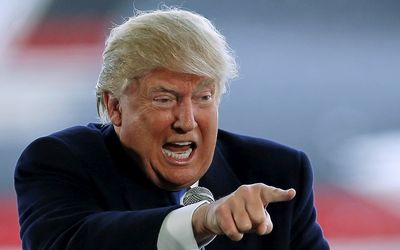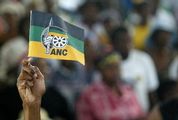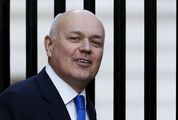Analyses show US voters leaning to the left
by John Stremlau,
2016-03-17 05:58:57.0
DONALD Trump’s march to the Republican nomination to become the 45th president of the US now seems as inexorable as it is inexplicable to much of the rest of the world, prompting governments to ask: can he win the November general election, and what would a Trump presidency mean for them?
The US’s neighbours and closest allies are clearly worried. Mexico’s President Enrique Nieto, whose country has borne the brunt of Trump’s xenophobia, decried his rise as similar that of Mussolini and Hitler. Canada’s progressive Prime Minister Justin Trudeau has been less direct, but signalled his country’s strong support for a continuation of the policies of the Obama administration during a glamorous state visit last week.
Britain’s parliament held an extraordinary debate on whether to ban Trump from visiting the UK on the basis that his comments on Muslims constitute hate speech, although no vote was taken ultimately.
Senior French officials have voiced concern and German Chancellor Angela Merkel and her economic affairs and energy minister, Sigmar Gabriel, branded Trump "a threat to peace and prosperity".
As for Trump, thus far, he has issued no foreign policy papers and relies on no known team of advisers.
He has almost nothing to say about Africa, beyond describing SA as "a total and very dangerous mess". Regarding the US’s growing anti-racism movement Trump says: "If ‘Black Lives Matter’, then go back to Africa. We’ll see how much they matter there."
Separate analyses by the New York Times and the Politico agree that on matters of international trade and economic policy Trump has been consistent for decades in his advocacy of more mercantilist US policies of higher tariffs as a defence against low-cost imports, a sharp break with 200 years of economic orthodoxy that many leading economists warn would risk global depression.
So, what are the chances of a Trump presidency? The passions and prejudices evident in historically high Republican primary votes grab headlines, but ignore broader forces.
Democrats still hold huge advantages among blacks, Asians, Hispanics, well-educated adults and the large cohort of millennials born after 1980. This is the same coalition that gave US President Barack Obama successive electoral wins in excess of 51%, which had not been done since Dwight Eisenhower in 1956.
In gauging the chances of the Democrats’ almost certain nominee, Hillary Clinton, the widely respected Pew Research Centre’s 2015 study, A Deep Dive Into Party Affiliation, based on 25,000 interviews, shows voter affiliation still matters.
Only 23% of the electorate identify as Republicans. Trump’s primary pluralities represent little more than a third of a quarter of US voters. Clinton, with only one opponent, is already much closer to winning the Democratic nomination, with Democrats 30% of the electorate.
Competition for the historically high 39% who identify as independents will be fierce, but Pew estimates when "leaners" are taken into account, Democrats have a 48% to 39% advantage over Republicans.
Another recent NBC/Wall Street Journal poll shows Trump by far the most unpopular, with 64% negative and 25% positive, and Clinton at 51% negative vs 38% positive. Globally, Obama remains the most popular US leader, perhaps since John Kennedy’s election in 1960. According to another Pew survey, 71% of South Africans view Obama positively.
African National Congress secretary-general Gwede Mantashe and other leading party figures should be identifying with foreign powers condemning Trump for his advocacy of protectionism, racism and bigotry. Ensuring a continuation of Obama’s policies on globalisation, the environment, a restrained military, multilateral co-operation, engaging Iran, normalising ties with Cuba, and a host of other issues, are surely in SA’s interests as well.
Stremlau is visiting professor of international relations at Wits University

US Republican presidential candidate Donald Trump speaks at a campaign rally in Bloomington, Illinois, on Sunday. Picture: REUTERS/JIM YOUNG
DONALD Trump’s march to the Republican nomination to become the 45th president of the US now seems as inexorable as it is inexplicable to much of the rest of the world, prompting governments to ask: can he win the November general election, and what would a Trump presidency mean for them?
The US’s neighbours and closest allies are clearly worried. Mexico’s President Enrique Nieto, whose country has borne the brunt of Trump’s xenophobia, decried his rise as similar that of Mussolini and Hitler. Canada’s progressive Prime Minister Justin Trudeau has been less direct, but signalled his country’s strong support for a continuation of the policies of the Obama administration during a glamorous state visit last week.
Britain’s parliament held an extraordinary debate on whether to ban Trump from visiting the UK on the basis that his comments on Muslims constitute hate speech, although no vote was taken ultimately.
Senior French officials have voiced concern and German Chancellor Angela Merkel and her economic affairs and energy minister, Sigmar Gabriel, branded Trump "a threat to peace and prosperity".
As for Trump, thus far, he has issued no foreign policy papers and relies on no known team of advisers.
He has almost nothing to say about Africa, beyond describing SA as "a total and very dangerous mess". Regarding the US’s growing anti-racism movement Trump says: "If ‘Black Lives Matter’, then go back to Africa. We’ll see how much they matter there."
Separate analyses by the New York Times and the Politico agree that on matters of international trade and economic policy Trump has been consistent for decades in his advocacy of more mercantilist US policies of higher tariffs as a defence against low-cost imports, a sharp break with 200 years of economic orthodoxy that many leading economists warn would risk global depression.
So, what are the chances of a Trump presidency? The passions and prejudices evident in historically high Republican primary votes grab headlines, but ignore broader forces.
Democrats still hold huge advantages among blacks, Asians, Hispanics, well-educated adults and the large cohort of millennials born after 1980. This is the same coalition that gave US President Barack Obama successive electoral wins in excess of 51%, which had not been done since Dwight Eisenhower in 1956.
In gauging the chances of the Democrats’ almost certain nominee, Hillary Clinton, the widely respected Pew Research Centre’s 2015 study, A Deep Dive Into Party Affiliation, based on 25,000 interviews, shows voter affiliation still matters.
Only 23% of the electorate identify as Republicans. Trump’s primary pluralities represent little more than a third of a quarter of US voters. Clinton, with only one opponent, is already much closer to winning the Democratic nomination, with Democrats 30% of the electorate.
Competition for the historically high 39% who identify as independents will be fierce, but Pew estimates when "leaners" are taken into account, Democrats have a 48% to 39% advantage over Republicans.
Another recent NBC/Wall Street Journal poll shows Trump by far the most unpopular, with 64% negative and 25% positive, and Clinton at 51% negative vs 38% positive. Globally, Obama remains the most popular US leader, perhaps since John Kennedy’s election in 1960. According to another Pew survey, 71% of South Africans view Obama positively.
African National Congress secretary-general Gwede Mantashe and other leading party figures should be identifying with foreign powers condemning Trump for his advocacy of protectionism, racism and bigotry. Ensuring a continuation of Obama’s policies on globalisation, the environment, a restrained military, multilateral co-operation, engaging Iran, normalising ties with Cuba, and a host of other issues, are surely in SA’s interests as well.
Stremlau is visiting professor of international relations at Wits University
























Change: 1.19%
Change: 1.36%
Change: 2.19%
Change: 1.49%
Change: -0.77%
Data supplied by Profile Data
Change: -0.19%
Change: 0.69%
Change: 1.19%
Change: 0.00%
Change: 0.44%
Data supplied by Profile Data
Change: 0.62%
Change: 0.61%
Change: 0.23%
Change: 0.52%
Change: 0.12%
Data supplied by Profile Data
Change: -0.21%
Change: -1.22%
Change: -0.69%
Change: -0.51%
Change: 0.07%
Data supplied by Profile Data